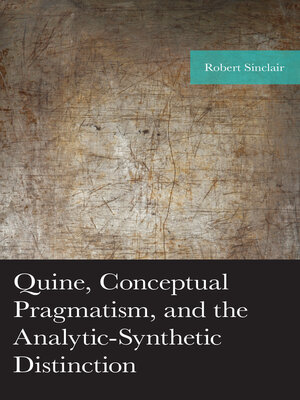Quine, Conceptual Pragmatism, and the Analytic-Synthetic Distinction
ebook ∣ American Philosophy Series
By Robert Sinclair

Sign up to save your library
With an OverDrive account, you can save your favorite libraries for at-a-glance information about availability. Find out more about OverDrive accounts.
Find this title in Libby, the library reading app by OverDrive.



Search for a digital library with this title
Title found at these libraries:
| Library Name | Distance |
|---|---|
| Loading... |
W. V. Quine's occasional references to his 'pragmatism' have often been interpreted as suggesting a possible link to the American Pragmatism of Peirce, James, and Dewey. Quine, Conceptual Pragmatism, and the Analytic-Synthetic Distinction argues that the influence of pragmatism on Quine's philosophy is more accurately traced to his teacher C.I. Lewis and his conceptual pragmatism from Mind and the World Order, and his later An Analysis of Knowledge and Valuation. Quine's epistemological views share many affinities with Lewis's conceptual pragmatism, where knowledge is conceived as a conceptual framework pragmatically revised in light of what future experience reveals. Robert Sinclair further defends and elaborates on this claim by showing how Lewis's influence can be seen in several key episodes in Quine's philosophical development. This not only highlights a forgotten element of the epistemological backdrop to Quine's mid-century criticism of the analytic-synthetic distinction, but Sinclair further argues that it provides the central epistemological framework for the form and content of Quine's later naturalized conception of epistemology.






